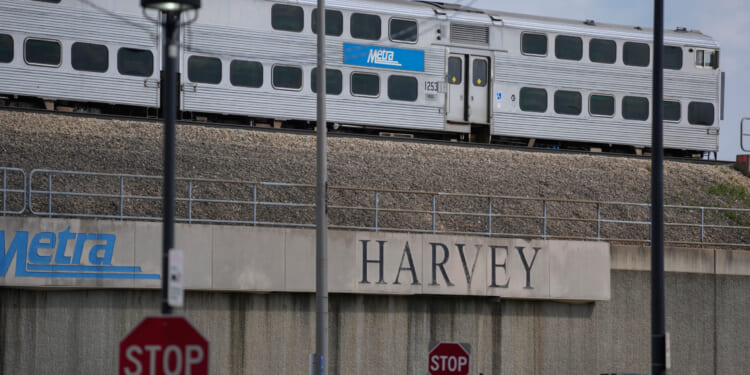Harvey became the second city in 35 years to ask the state to step in under Illinois’ Financially Distressed City Law. It won’t address the main issue: growing pension liabilities.
The City of Harvey recently voted unanimously to request certification as a financially distressed city under Illinois’ Financially Distressed City Law. If the Department of Revenue certifies it as such, it will mean state oversight over the city’s budget and contracts and more options for accessing additional credit.
Even with state oversight, Harvey can’t address its biggest issue. After years of financial mismanagement and missed contributions to both its police and fire pension funds, the Harvey Police Pension Fund won a $7 million judgment against the city in 2017 through the state’s pension intercept law.
Even after the city laid off 40 police and fire employees, Harvey had to negotiate with both pension funds as well as the Illinois Municipal Retirement Fund to access a portion of its tax revenues – just to meet payroll.
Now Harvey has requested state oversight, and followed up by partially shutting down services and furloughing over 40% of the city’s workers. Here’s what you need to know about the dire straits that pushed Harvey to this point and how the financial oversight that could be coming still isn’t enough.
Harvey’s spiral into insolvency
Between 2016 and 2018, Harvey defaulted multiple times on debt service payments, and remained in default until August of 2023. As of April 2020, the city’s police pension was a little over 53% funded, and as of April 2021, the firefighter pension fund was only 18% funded.
Experts warn pensions with funding ratios below 60% are deeply troubled and plans with funding ratios below 40% are likely to be past the point of no return.
The city’s annual budget for fiscal year 2021-2022, the most recent year available, appropriated almost one-fifth of its budget on police and fire pension payments and debt service. Those expenditures made up nearly half of their 2021 municipal property tax levy.
Now, just over five years later, Harvey’s situation has hardly improved.
While the Department of Revenue has not yet certified the city as financially distressed, the city must show it is in the highest 5% of all home rule cities in terms of aggregate property tax rate and the lowest 5% of home rule cities in terms of per capita property tax yields.
Despite Harvey’s difficulties it would not have been eligible. It was not even in the top 7.5% of aggregate property tax rates or the bottom 13% of per capita property tax yield. Phoenix, Illinois was the only city of over 200 home rule municipalities that would have qualified.
What it means for Harvey
Putting the city under financial oversight by the state is long-term. The law requires any financially distressed city to submit annual financial plans for approval by the financial advisory authority created under state law.
Harvey would need the authority’s approval before entering any contract or loan agreement. The city would remain under the authority’s oversight until it is able to submit a balanced budget ten years in a row.
The authority’s power is limited, however. For example, it cannot impose its own budget on the financially distressed city. A distressed city only needs the authority’s approval for the first year of a multi-year collective bargaining agreement, not the full term of the agreement.
But even if the authority had complete financial control, it wouldn’t fix the issue of fewer taxpayers on the hook for rising pension costs.
Harvey may be hoping for a state bailout. State Rep. Will Davis, D-East Hazel Crest, filed House Bill 4024 earlier this year appropriating $30 Million to the Illinois Department of Commerce and Economic Opportunity specifically grants to go to Harvey to pay for operating expenses.
The bill is currently sitting in the Illinois House Rules Committee with no sign of moving. Harvey might want the money, but it doesn’t solve the pension costs driving its $164 million in debt. Illinois faces its own ballooning budget too.
Harvey needs pension reform at the state level
For Harvey’s issues, Illinois lawmakers must deal with the city’s insurmountable pension debt. The best way to do is amending the state constitution to allow for adjustments in future growth of pension benefits while protecting the benefits pensioners are receiving now.
Another option would be to authorize the city to file for Chapter 9 bankruptcy as municipalities in 24 other states are allowed to do.
There is federal precedent for bankruptcy courts authorizing the reduction of a municipality’s pension debt even when the state’s constitution would prevent the legislature from doing so.
If Chapter 9 were available to Harvey, it may be able to do the same. And even if the city did not file for Chapter 9, having the option could bring its creditors to the table to negotiate a way out.
Illinois can prevent cities from insolvency, but will need to take on the fundamental cost drivers dragging them into the abyss: massive and unsustainable pension liabilities.










